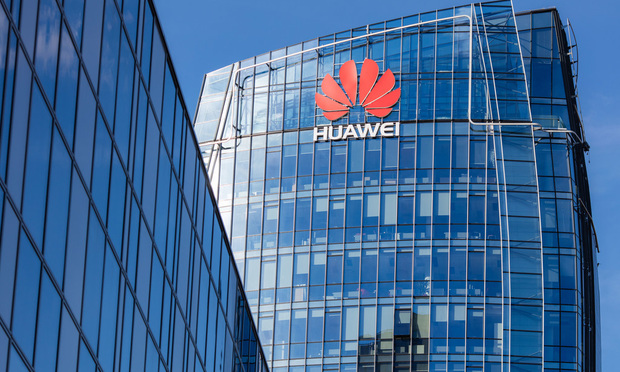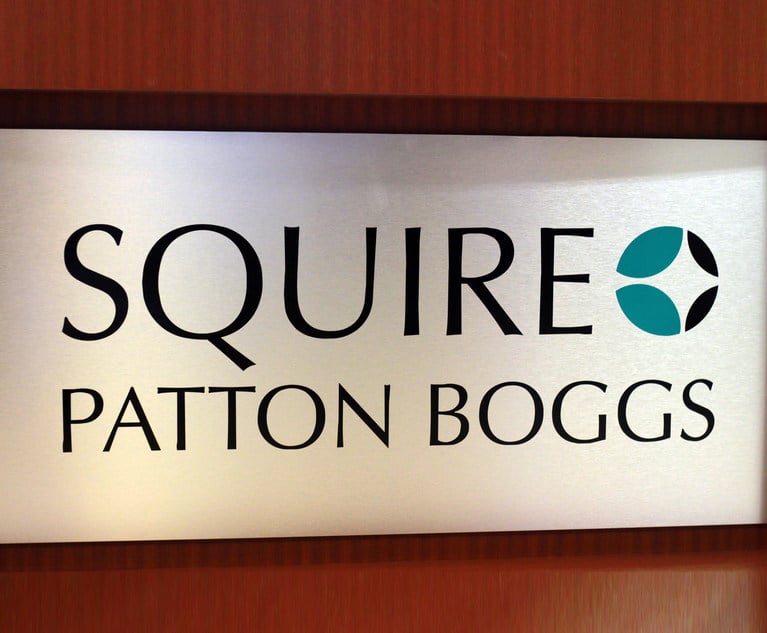Sidley Austin Represents Huawei in Lawsuit Against Commerce Department
The Chinese company is suing over a 2017 equipment seizure that remains unresolved in the latest action between the telecom giant and the U.S. government.
June 24, 2019 at 11:20 AM
3 minute read
 (Photo: J. Lekavicius/Shutterstock.com)
(Photo: J. Lekavicius/Shutterstock.com)
Sidley Austin lawyers have filed a civil suit on behalf of Huawei Technologies Co. Ltd. against the U.S. Department of Commerce over an equipment seizure.
In a complaint filed with the U.S. District Court for the District of Columbia on Friday, Huawei said several pieces of its equipment "remain in a bureaucratic limbo in an Alaskan warehouse", after being seized by the federal government in 2017.
The lawsuit is the latest in a series of actions between the Chinese company and the Trump administration. In December, the Department of Justice had chief financial officer Meng Wanzhou detained in Vancouver, Canada; and in May, the company was effectively blacklisted from trading with U.S. businesses. Huawei has sued the federal government, alleging that the administration's actions against the company are unconstitutional.
Sidley litigation partners Frank Volpe and Griffith Green are leading a Washington, D.C.-based team representing Huawei. Meanwhile, in a separate case, the firm's Washington, D.C. partner James Cole is also representing the Chinese company on charges related to Iran sanctions violation, before the District Court for the Eastern District of New York. The Department of Justice has been manoeuvring to remove Cole, an Obama-era deputy attorney general, from the case, citing conflict of interest.
The equipment in question was on its way back to China in September 2017, after being tested in a Californian lab when the commerce department's Bureau of Industry and Security (BIS) and Office of Export Enforcement took possession of it. Huawei said the government later informed the company that it would investigate the equipment and determine whether shipping it back to China required a licence under the Export Administration Regulations.
In the filing, Huawei said it didn't apply for a licence for the shipment because the equipment was, in 2017, exempt from the export control regulations. That would change, as Huawei acknowledged in the filing, in May 2019 when the BIS added the Chinese telecoms company to its so-called Entity List.
Huawei said it submitted a formal request in November 2017 for the BIS to conduct a review to determine whether a licence was needed, but never heard back. The company said the normal processing time for such requests is fewer than 45 days.
The Chinese company said it doesn't challenge the seizure itself but claimed the BIS's post-seizure actions were unlawful.
"The defendants have either failed to make a determination whether a licence was or is required for the shipment and further failed to provide Huawei any indication as to when (or whether) [they] intend to make that determination," read the complaint, "or determined that the equipment does not require a licence and, nevertheless, wrongfully continued to detain the equipment."
Huawei is now seeking declaratory relief that the BIS determine whether shipping the equipment back to China violates the EAR or, if not, release the seized equipment.
Related Stories:
Huawei's Chief Legal Officer Takes Center Stage in Conflict With US
Huawei Taps Jones Day, Morgan Lewis in Challenge to US Defense Law
This content has been archived. It is available through our partners, LexisNexis® and Bloomberg Law.
To view this content, please continue to their sites.
Not a Lexis Subscriber?
Subscribe Now
Not a Bloomberg Law Subscriber?
Subscribe Now
NOT FOR REPRINT
© 2025 ALM Global, LLC, All Rights Reserved. Request academic re-use from www.copyright.com. All other uses, submit a request to [email protected]. For more information visit Asset & Logo Licensing.
You Might Like
View All
Squire Patton Boggs Hires 7-Lawyer Team to Beef Up ESG Practice in Brussels
2 minute read

Kirkland’s O’Shea Acts Alongside Former Outfit Simpson Thacher on KKR Deal
2 minute read
King & Spalding and Ex-Partner Accused of Fraud After Client Claims £1.7 Million Deposit Loss
2 minute readTrending Stories
Who Got The Work
J. Brugh Lower of Gibbons has entered an appearance for industrial equipment supplier Devco Corporation in a pending trademark infringement lawsuit. The suit, accusing the defendant of selling knock-off Graco products, was filed Dec. 18 in New Jersey District Court by Rivkin Radler on behalf of Graco Inc. and Graco Minnesota. The case, assigned to U.S. District Judge Zahid N. Quraishi, is 3:24-cv-11294, Graco Inc. et al v. Devco Corporation.
Who Got The Work
Rebecca Maller-Stein and Kent A. Yalowitz of Arnold & Porter Kaye Scholer have entered their appearances for Hanaco Venture Capital and its executives, Lior Prosor and David Frankel, in a pending securities lawsuit. The action, filed on Dec. 24 in New York Southern District Court by Zell, Aron & Co. on behalf of Goldeneye Advisors, accuses the defendants of negligently and fraudulently managing the plaintiff's $1 million investment. The case, assigned to U.S. District Judge Vernon S. Broderick, is 1:24-cv-09918, Goldeneye Advisors, LLC v. Hanaco Venture Capital, Ltd. et al.
Who Got The Work
Attorneys from A&O Shearman has stepped in as defense counsel for Toronto-Dominion Bank and other defendants in a pending securities class action. The suit, filed Dec. 11 in New York Southern District Court by Bleichmar Fonti & Auld, accuses the defendants of concealing the bank's 'pervasive' deficiencies in regards to its compliance with the Bank Secrecy Act and the quality of its anti-money laundering controls. The case, assigned to U.S. District Judge Arun Subramanian, is 1:24-cv-09445, Gonzalez v. The Toronto-Dominion Bank et al.
Who Got The Work
Crown Castle International, a Pennsylvania company providing shared communications infrastructure, has turned to Luke D. Wolf of Gordon Rees Scully Mansukhani to fend off a pending breach-of-contract lawsuit. The court action, filed Nov. 25 in Michigan Eastern District Court by Hooper Hathaway PC on behalf of The Town Residences LLC, accuses Crown Castle of failing to transfer approximately $30,000 in utility payments from T-Mobile in breach of a roof-top lease and assignment agreement. The case, assigned to U.S. District Judge Susan K. Declercq, is 2:24-cv-13131, The Town Residences LLC v. T-Mobile US, Inc. et al.
Who Got The Work
Wilfred P. Coronato and Daniel M. Schwartz of McCarter & English have stepped in as defense counsel to Electrolux Home Products Inc. in a pending product liability lawsuit. The court action, filed Nov. 26 in New York Eastern District Court by Poulos Lopiccolo PC and Nagel Rice LLP on behalf of David Stern, alleges that the defendant's refrigerators’ drawers and shelving repeatedly break and fall apart within months after purchase. The case, assigned to U.S. District Judge Joan M. Azrack, is 2:24-cv-08204, Stern v. Electrolux Home Products, Inc.
Featured Firms
Law Offices of Gary Martin Hays & Associates, P.C.
(470) 294-1674
Law Offices of Mark E. Salomone
(857) 444-6468
Smith & Hassler
(713) 739-1250








